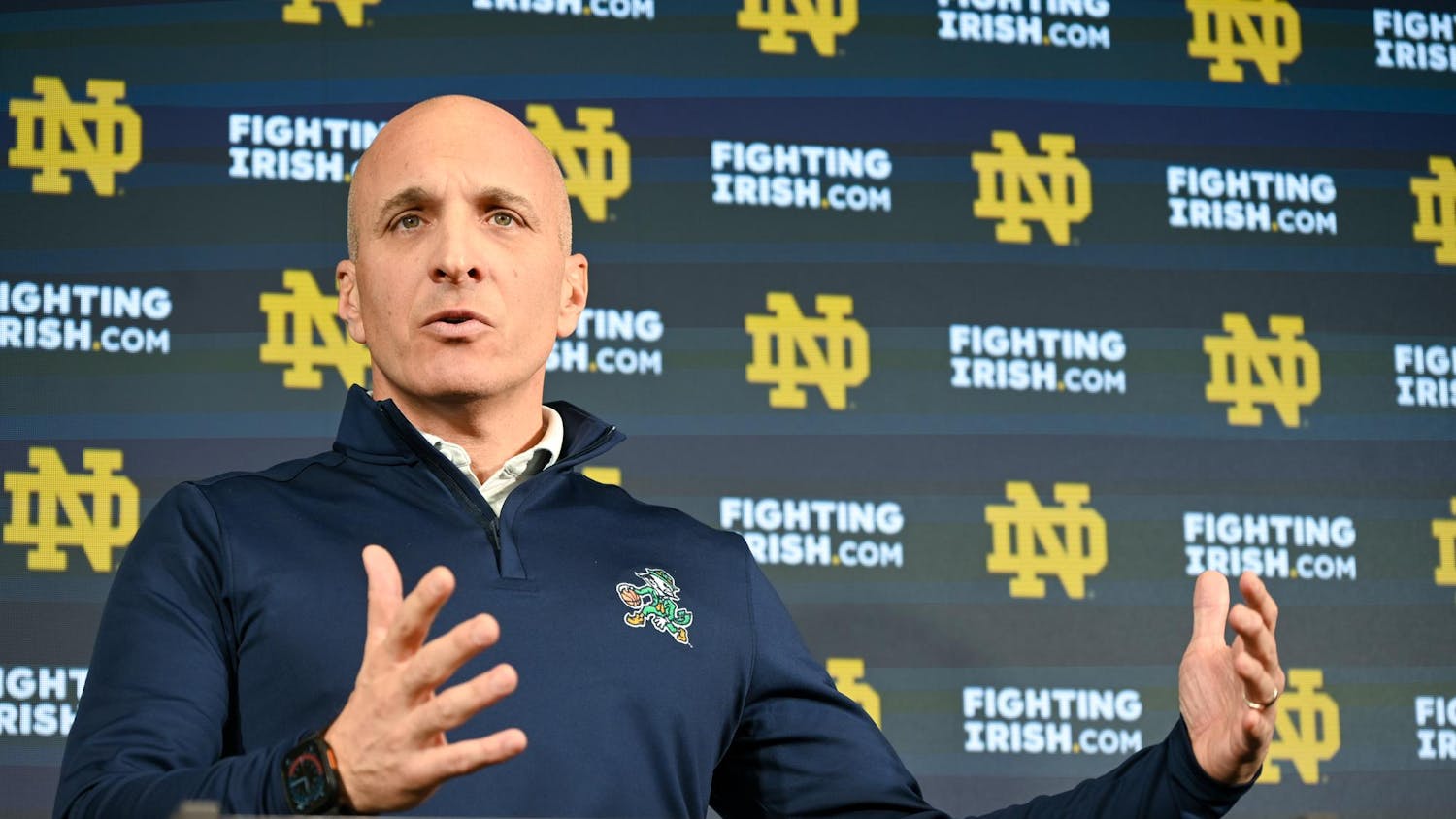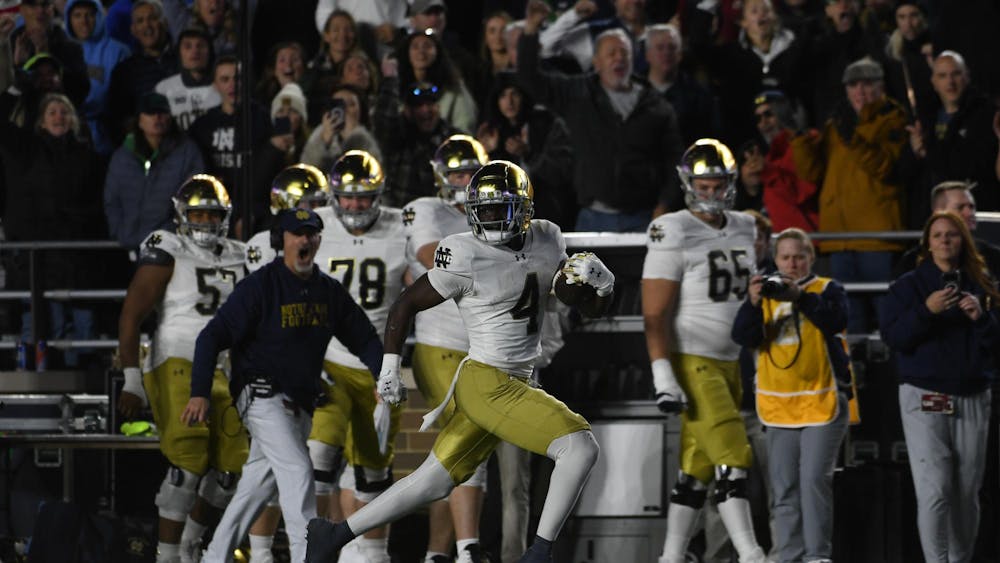Editor's note: This is the seventh of a new Observer feature. The "Waking the Echoes" series intends to inform fans about some former players and will feature weekly stories profiling them and their lives since Notre Dame.
Notre Dame fans did not know it, but they were witnessing the future of college football.
On Oct. 7, 2000 against Stanford, former Irish quarterback Matt LoVecchio, then a freshman signal caller, made his first career collegiate start. On the first drive of the game, Notre Dame scored a touchdown using an array of four- and five-receiver shotgun sets, zone-read option plays and designed quarterback draws.
Sound familiar? That's right, Notre Dame ran the spread offense long before Brian Kelly brought his attack to South Bend.
"It's crazy to look back and watch what we were able to do as an offense at the time and how that spread offense really evolved to what it is now. It's pretty neat," LoVecchio said in a phone interview with The Observer.
The opening drive - rumored to have been called by then-receivers coach Urban Meyer - helped LoVecchio settle in and lead the Irish to a 20-14 victory over the Cardinal.
"It was a great way to start the game and build your confidence level for myself personally for the rest of the team knowing that we have the ability to go in there and run a lot of different sets and the ability to check into different plays, run the ball and throw the ball effectively," LoVecchio said. "That really set the tone for how were able to play the rest of the game."
While Meyer was one of the first people to greet him on the sideline after the drive, LoVecchio said the current Ohio State head coach did not solely call the drive.
"The whole offensive staff was involved," LoVecchio said. "I don't know who exactly was calling the offense but I think coach Meyer's input was definitely there as well."
Despite the strong opening drive, LoVecchio finished the game 10-for-18 for 100 yards although he did toss two touchdown passes. He also rushed for 36 yards on 13 carries in his debut.
"There's so much going on around you and you need to make sure you have the right personnel grouping, make sure you're getting the play with enough time to get up to the line of scrimmage," LoVecchio said. "You need to make sure, you're in the right play you're supposed to be. I just remember being really focused and taking it one series at a time. That's the way I approached the entire season."
LoVecchio earned the start after starting quarterback Arnaz Battle suffered an injury and backup Gary Godsey struggled against Michigan State. LoVecchio entered the 27-21 loss to the Spartans in the second half and completed one pass for 43 yards.
Former Irish coach Bob Davie told LoVecchio he would be starting against Stanford early the next week.
"At the time, I never really had expectations playing my first year," LoVecchio said. "I just wanted to go into school and get acclimated to the college environment and just kind of settle in and learn the offense and mature physically. Just the reality of the situation and how things unfolded, I became more prepared."
After leading the Irish to a win over Stanford, the Franklin Lakes, N.J., native earned the next seven starts in the season, leading Notre Dame to a BCS berth. He was 7-1 as a starter in 2000.
"[The Stanford game] was step one but you're only as good as your last play, in this case, your last game," LoVecchio said. "It's not to say that I deserved it for the entire season because it was too early at the time. Based on the performance of that game, I think I was worthy of starting the next game."
With LoVecchio at the helm, the Irish reeled off seven consecutive wins, climbing from No. 25 in the rankings all the way to No. 10 before losing by 32 points to Oregon State in the Fiesta Bowl.
"Guys started having more confidence in myself and our ability to go out there and execute. As the wins keep coming, you start to build confidence. Winning is contagious," LoVecchio said. "That part of the year everybody contributed and I think we had great team camaraderie and all the wins came as a team."
LoVecchio finished 2000 with 980 passing yards, 11 touchdowns and just one interception while also gaining 300 yards on the ground.
Despite winning his first seven starts the previous year and being named an early Heisman hopeful by Sports Illustrated, LoVecchio did not enter the 2001 season as Notre Dame's clear-cut No. 1 quarterback. He would have to battle Carlyle Holiday and Jared Clark for the starting job.
LoVecchio started the season opener at Nebraska and a road tilt at Michigan State before he was lifted in favor of Holiday before the third game. Notre Dame lost its first three games and was off to the first 0-3 start in program history.
Despite the diminished playing time, LoVecchio - who eventually transferred to Indiana - said that was not the beginning of the end of his time at Notre Dame.
"Not at all," he said. "We started out the year losing to Nebraska on the road, lost to Michigan State and then they made the decision to change gears on offense as a result of not moving the ball downfield and putting up points. Carlyle got an opportunity. It was not the end of my time at Notre Dame as a result of that."
In the final eight games of the season, LoVecchio attempted a total of 11 passes as the Irish sputtered to a 5-6 season that would be Davie's last. LoVecchio transferred after the season.
He said there was not a specific reason for his transfer and added that he does not regret leaving Notre Dame.
"I don't. I'm grateful for the opportunity that Notre Dame gave me," LoVecchio said. "I met a bunch of great people as teammates, coaches, teachers, administrators. It's a special place. I look back at my time there and I only have good things to say.
"It's easy to look back in life and say 'What if I did this different?' or 'What if I did that?' Going back to where my head was at the time, it's tough to pinpoint a specific reason. I look back at my time at Notre Dame and I have nothing but positive memories."
LoVecchio said he also considered Boston College and Miami before choosing the Hoosiers, in part because the West Coast offense current Michigan offensive coordinator Al Borges was installing.
After a brief tryout with the New York Giants, LoVecchio turned down opportunities to play in NFL Europe in order to chase a job on Wall Street. The economics major previously worked for Merrill-Lynch and Bank of America and now is an institutional bonds trader for Wells Fargo and lives in New York.
"I look back at my athletic career, you can make so many correlations and comparisons to some of the stuff I've gone through. Football has prepared me to be able to handle a lot of the different types of adversity," said LoVecchio, 30. "There's not a day that goes by where I don't use something that's happened in the past and how it relates to it. After having played over four years of college football, you learn a lot from your experiences both on and off the field."
A full transcript of our interview with Matt LoVecchio will be available Saturday morning at ndsmcobserver.com
Contact Matthew DeFranks at mdefrank@nd.edu








